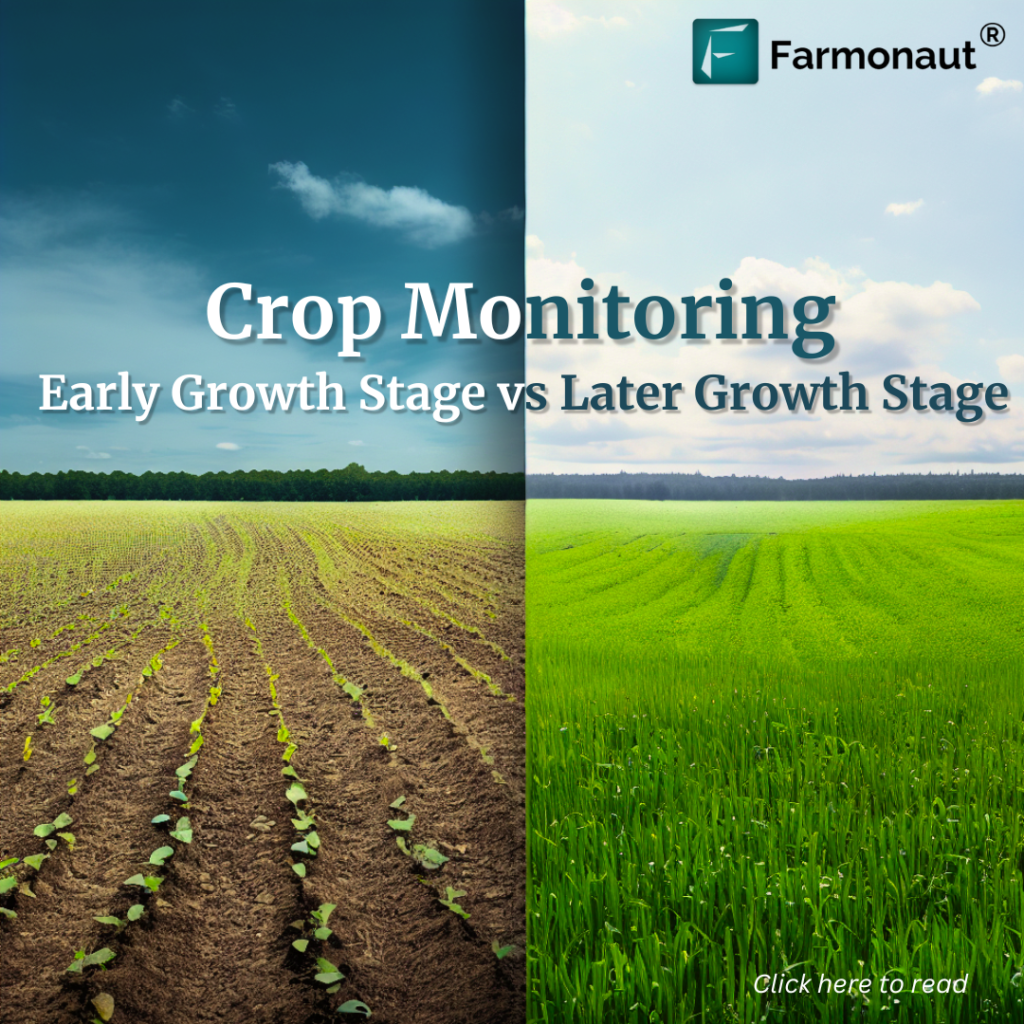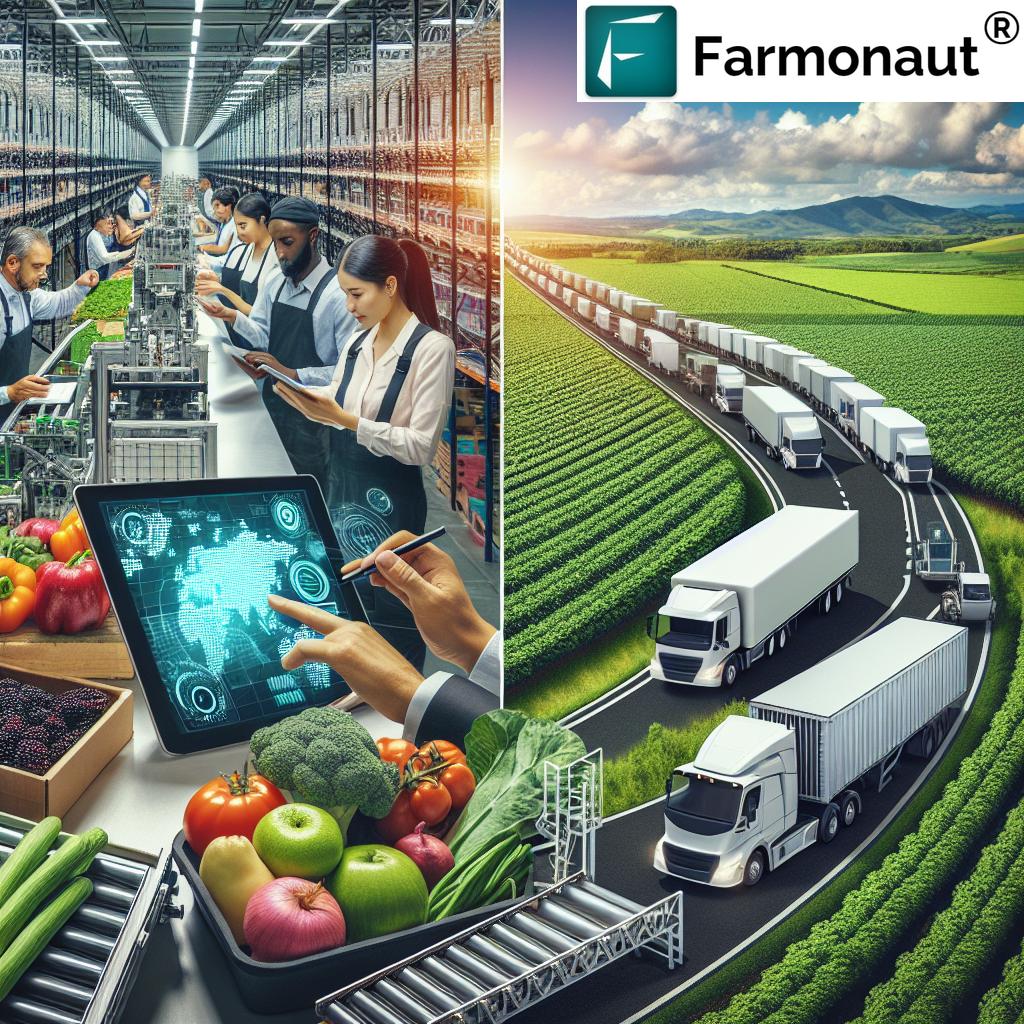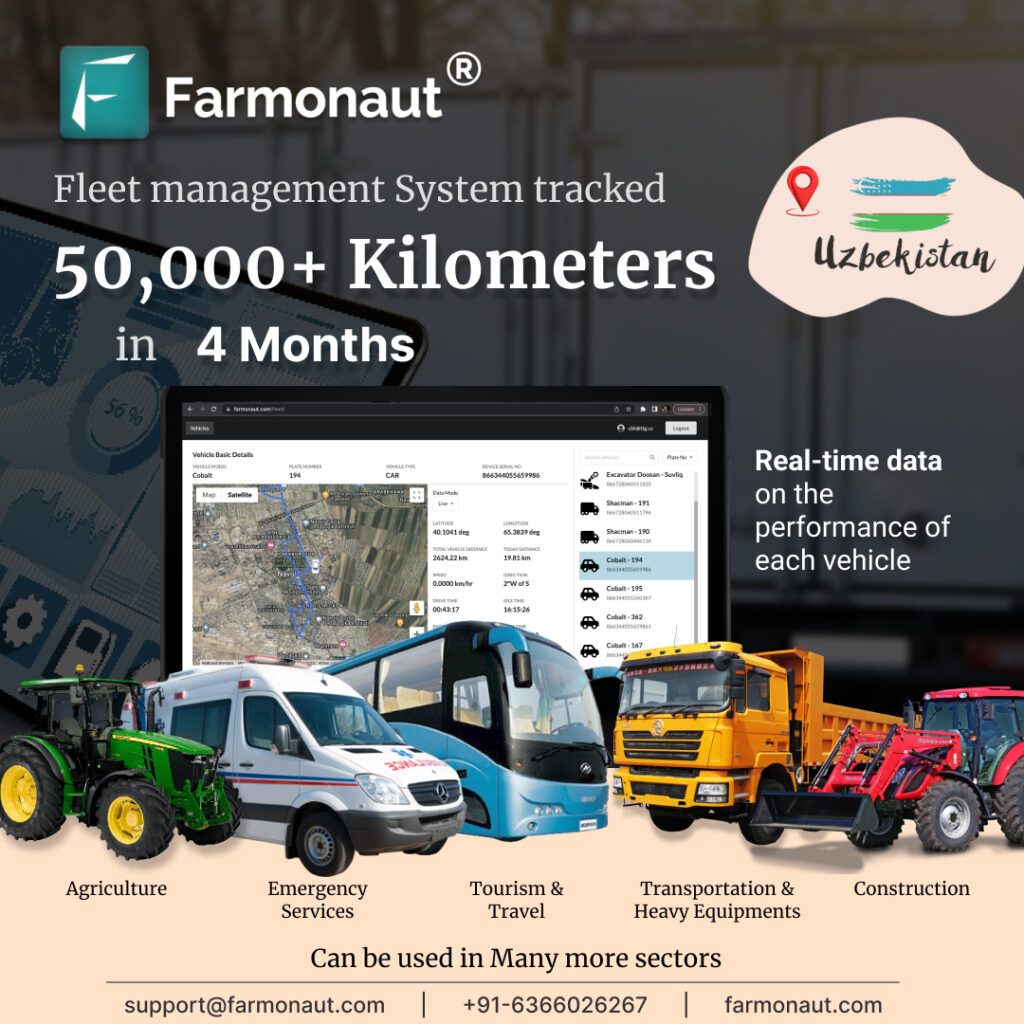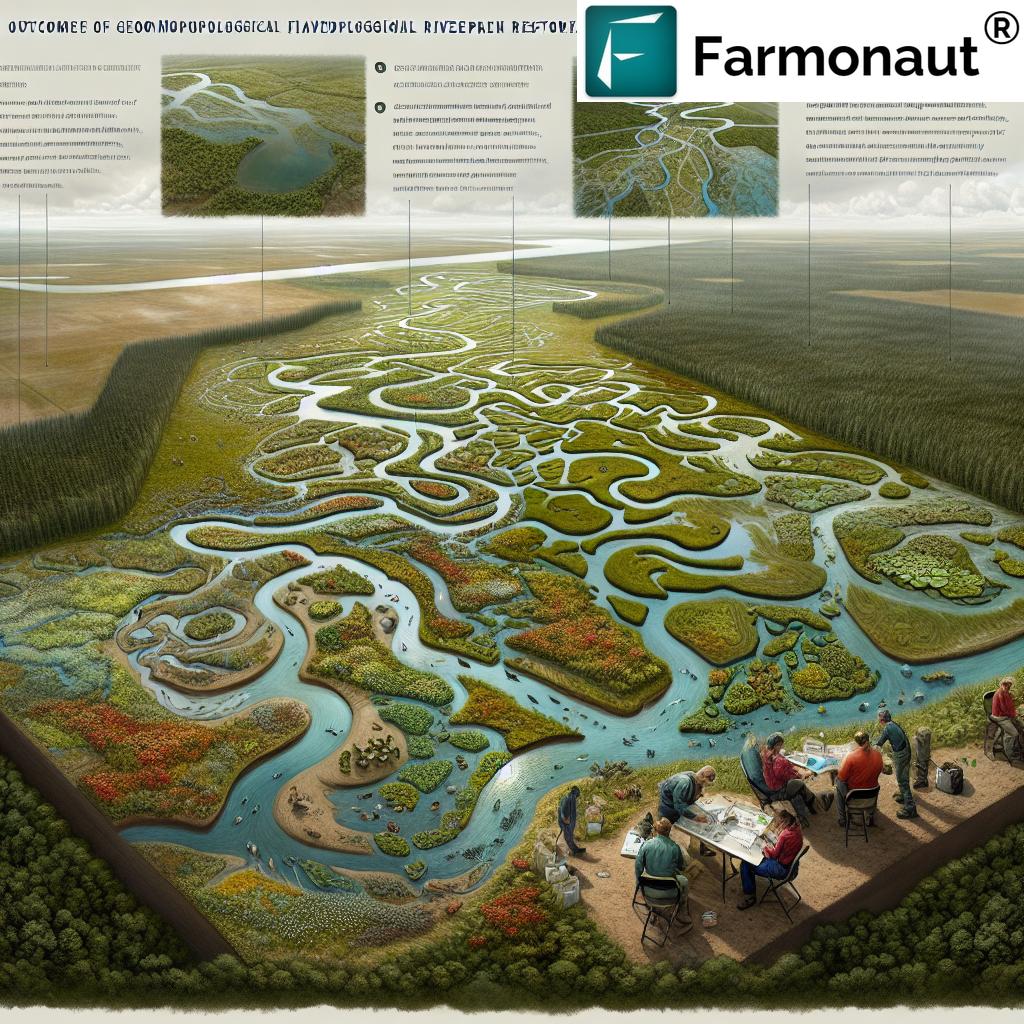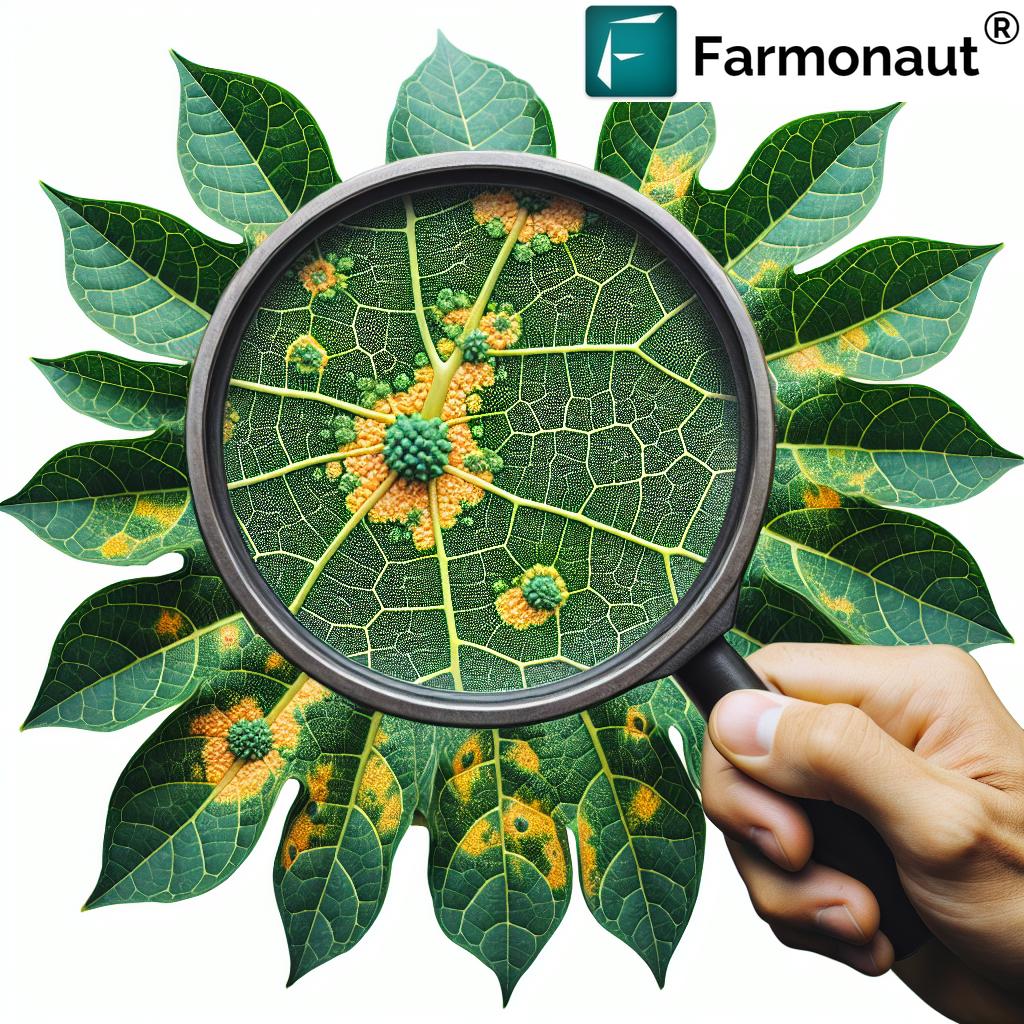Revolutionizing AgriTech: How Sustainable Farming Innovations Are Driving Clean Growth and Resource Efficiency
“AgriTech innovations have the potential to reduce greenhouse gas emissions by up to 20% in the agricultural sector.”
In the ever-evolving landscape of agriculture, we find ourselves at the cusp of a technological revolution that promises to reshape the way we grow, harvest, and distribute food. As representatives of Farmonaut, we are excited to explore the cutting-edge advancements in agritech innovation and sustainable farming technologies that are propelling the industry towards a more efficient and environmentally conscious future.
The agricultural sector stands as both a significant contributor to greenhouse gas emissions and a potential solution to our climate crisis. With the global population expected to reach 9.7 billion by 2050, the challenge of feeding the world while reducing our environmental footprint has never been more pressing. This is where the intersection of agriculture and technology – AgriTech – comes into play, offering a beacon of hope for clean growth and resource efficiency.
The AgriTech Revolution: A Path to Sustainability
AgriTech encompasses a wide range of technologies and innovative approaches aimed at enhancing agricultural productivity, sustainability, and profitability. From precision farming techniques to AI-driven crop management systems, these advancements are not just improving yields but are also addressing critical environmental concerns.
- Precision Agriculture: Utilizing GPS, sensors, and data analytics to optimize resource use
- Vertical Farming: Maximizing space and reducing water consumption in urban environments
- AI and Machine Learning: Providing predictive insights for crop management and disease control
- Blockchain Technology: Enhancing traceability and transparency in the agricultural supply chain
- Drone Technology: Offering aerial insights for crop monitoring and targeted interventions
These innovations are not just theoretical concepts; they are being implemented across farms worldwide, driving tangible improvements in resource efficiency and environmental stewardship.
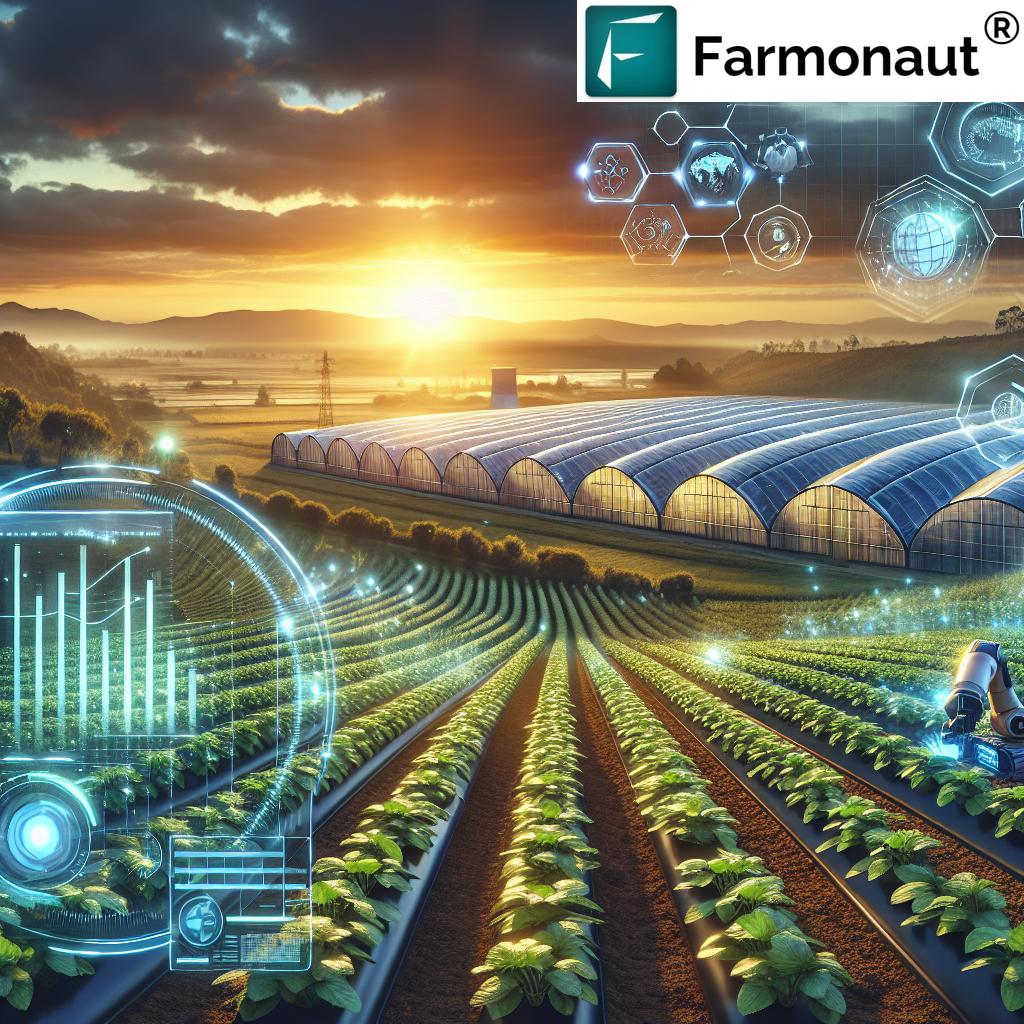
Farmonaut: Pioneering Sustainable AgriTech Solutions
At Farmonaut, we are proud to be at the forefront of this agricultural transformation. Our satellite-based farm management solutions are designed to make precision agriculture accessible and affordable to farmers worldwide. By leveraging advanced technologies such as satellite imagery, artificial intelligence, and blockchain, we are enabling farmers to make data-driven decisions that optimize crop yields while minimizing environmental impact.
Our platform offers a range of services that directly contribute to clean growth and resource efficiency:
- Real-time Crop Health Monitoring: Using multispectral satellite images to provide insights into vegetation health and soil moisture levels
- Jeevn AI Advisory System: An AI-driven tool delivering personalized farm advice and weather forecasts
- Blockchain-Based Product Traceability: Ensuring transparency and security in agricultural supply chains
- Fleet and Resource Management: Optimizing vehicle usage and agricultural machinery management
- Carbon Footprinting: Tracking and reducing environmental impact in real-time
Explore our innovative solutions:
The Impact of AgriTech on Clean Growth
The adoption of AgriTech solutions is having a profound impact on the agricultural sector’s environmental footprint. By optimizing resource use and reducing waste, these technologies are driving clean growth in several key areas:
- Reduced Water Usage: Precision irrigation systems can reduce water consumption by up to 30%
- Decreased Pesticide Application: Targeted spraying guided by AI and drone technology can cut pesticide use by 20-40%
- Lowered Carbon Emissions: Optimized machinery use and reduced tillage practices are slashing fuel consumption and soil carbon release
- Improved Soil Health: Data-driven soil management practices are enhancing soil structure and biodiversity
- Enhanced Crop Yields: Precision farming techniques are increasing yields while using fewer resources
“Sustainable farming technologies can improve resource efficiency in agriculture by 30-40%, according to recent studies.”
Investing in AgriTech: A Growing Trend
The potential for AgriTech to drive sustainable growth has not gone unnoticed by investors. The sector has seen a surge in investment in recent years, with venture capital firms, private equity, and even traditional agricultural companies pouring funds into innovative startups and technologies.
Key investment areas include:
- Precision Agriculture Tools
- Farm Management Software
- Alternative Protein Sources
- Vertical Farming Systems
- Agricultural Biotechnology
This influx of capital is accelerating the development and adoption of sustainable farming technologies, creating a virtuous cycle of innovation and environmental improvement.
AgriTech Innovations Impact Matrix
| Technology Name | Primary Environmental Benefit | Estimated Resource Efficiency Improvement (%) | Potential GHG Emission Reduction (%) | Investment Trend | Adoption Challenges |
|---|---|---|---|---|---|
| Precision Agriculture | Reduced input waste | 20-30 | 10-15 | High | Initial cost, farmer training |
| Vertical Farming | Water conservation | 70-95 | 5-10 | Moderate | Energy consumption, limited crop variety |
| AI-driven Crop Management | Optimized resource use | 15-25 | 5-10 | High | Data quality, integration with existing systems |
| Drone Technology | Targeted pest control | 30-50 | 5-8 | Emerging | Regulatory hurdles, operator expertise |
| Blockchain for Supply Chain | Reduced food waste | 10-20 | 3-5 | Moderate | Industry-wide adoption, standardization |
Overcoming Challenges in AgriTech Adoption
While the potential of AgriTech is immense, its widespread adoption faces several challenges:
- Cost Barriers: Many farmers, especially smallholders, find the initial investment in advanced technologies prohibitive
- Technical Knowledge Gap: The complexity of some AgriTech solutions requires specialized knowledge and training
- Infrastructure Limitations: Rural areas often lack the necessary connectivity and power infrastructure to support advanced technologies
- Data Privacy Concerns: The collection and use of farm data raise questions about data ownership and privacy
- Regulatory Hurdles: Evolving regulations around new technologies can slow adoption rates
Addressing these challenges requires a concerted effort from technology providers, policymakers, and educational institutions. At Farmonaut, we’re committed to making our solutions accessible and user-friendly, bridging the gap between advanced technology and practical farm application.
The Role of Policy in Driving AgriTech Innovation
Government policies play a crucial role in fostering the growth of AgriTech and sustainable farming practices. Supportive policies can accelerate adoption rates and help overcome some of the challenges faced by the sector:
- Research and Development Funding: Increased public investment in AgriTech research
- Tax Incentives: Encouraging farmers to adopt sustainable technologies through tax breaks
- Regulatory Frameworks: Developing clear guidelines for new technologies like drones and gene editing
- Education and Training Programs: Supporting initiatives to upskill farmers in digital technologies
- Infrastructure Development: Investing in rural broadband and smart grid systems
By creating an enabling environment for AgriTech innovation, policymakers can help drive the transition towards more sustainable and efficient farming practices.
The Future of Farming: Integrating Technologies for Maximum Impact
As we look to the future, the true power of AgriTech lies in the integration of various technologies to create holistic farming systems. This integrated approach combines the strengths of different innovations to address complex agricultural challenges:
- IoT Sensors + AI Analytics: Real-time monitoring and predictive maintenance of farm equipment
- Satellite Imagery + Machine Learning: Advanced crop yield prediction and disease detection
- Robotics + Computer Vision: Automated harvesting and precise crop management
- Blockchain + IoT: End-to-end traceability and quality assurance in the food supply chain
These integrated systems not only enhance productivity but also contribute significantly to resource efficiency and environmental sustainability.
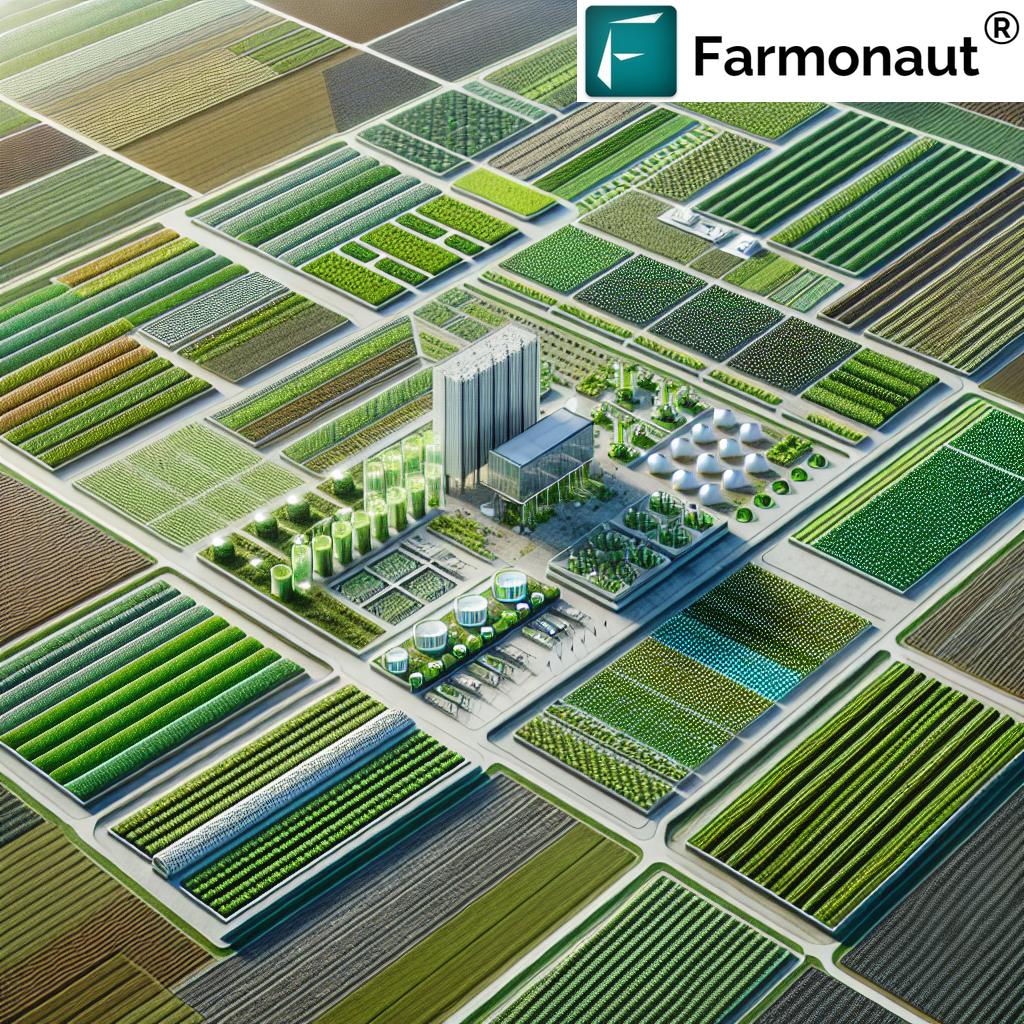
Farmonaut’s Vision for Sustainable Agriculture
At Farmonaut, our vision extends beyond providing cutting-edge technology. We aim to be a catalyst for sustainable agricultural practices worldwide. Our platform is designed to empower farmers of all scales to make informed decisions that benefit both their bottom line and the environment.
Key aspects of our approach include:
- Democratizing Access: Making advanced agricultural technologies accessible to farmers regardless of farm size or location
- Data-Driven Decision Making: Providing actionable insights that optimize resource use and reduce environmental impact
- Promoting Sustainable Practices: Encouraging the adoption of eco-friendly farming methods through our AI advisory system
- Continuous Innovation: Investing in R&D to stay at the forefront of AgriTech advancements
- Collaborative Ecosystem: Fostering partnerships with research institutions, government agencies, and other AgriTech companies to drive industry-wide progress
Discover how our API can enhance your agricultural solutions:
Farmonaut API
API Developer Docs
The Global Impact of AgriTech on Sustainable Development Goals
The adoption of AgriTech solutions is not just transforming individual farms; it’s contributing to broader global sustainability objectives. Specifically, these innovations are helping to address several United Nations Sustainable Development Goals (SDGs):
- SDG 2: Zero Hunger – Increasing agricultural productivity and resilience
- SDG 6: Clean Water and Sanitation – Improving water use efficiency in agriculture
- SDG 12: Responsible Consumption and Production – Reducing food waste and promoting sustainable farming practices
- SDG 13: Climate Action – Mitigating agriculture’s contribution to climate change
- SDG 15: Life on Land – Promoting sustainable land use and soil health
By aligning technological innovation with these global goals, the AgriTech sector is playing a crucial role in creating a more sustainable and food-secure world.
Case Study: Precision Agriculture in Action
To illustrate the real-world impact of AgriTech, let’s consider a hypothetical case study of a medium-sized farm implementing precision agriculture techniques:
Farm Profile:
- Location: Midwest United States
- Size: 500 acres
- Main Crops: Corn and Soybeans
Implemented Technologies:
- GPS-guided tractors
- Soil sensors for moisture and nutrient monitoring
- Drone-based crop health imaging
- Weather station integration
- Farm management software (like Farmonaut’s platform)
Results After One Year:
- 15% reduction in water usage
- 20% decrease in fertilizer application
- 10% increase in crop yield
- 30% reduction in pesticide use
- 18% decrease in fuel consumption
This case study demonstrates how the integration of various AgriTech solutions can lead to significant improvements in resource efficiency and productivity while reducing environmental impact.
The Role of Education and Training in AgriTech Adoption
As AgriTech continues to evolve, education and training become increasingly crucial. Farmers, agronomists, and agricultural workers need to develop new skills to effectively utilize these advanced technologies. Several initiatives are addressing this need:
- Agricultural Universities: Updating curricula to include AgriTech courses
- Online Learning Platforms: Offering specialized courses in precision agriculture and farm data management
- Government Extension Programs: Providing hands-on training in new farming technologies
- Industry Partnerships: Collaborations between AgriTech companies and educational institutions to provide practical training
At Farmonaut, we recognize the importance of user education. Our platform includes comprehensive training materials and support to ensure that farmers can fully leverage our technology to drive sustainable practices on their farms.
The Economic Case for Sustainable AgriTech
While the environmental benefits of AgriTech are clear, it’s equally important to highlight the economic advantages. Sustainable farming technologies not only contribute to clean growth but also offer significant financial benefits to farmers and the broader agricultural industry:
- Reduced Input Costs: Precision application of water, fertilizers, and pesticides leads to lower operational expenses
- Improved Crop Quality and Yield: Data-driven decision making results in higher-quality produce and increased yields
- New Revenue Streams: Technologies like carbon credit systems open up additional income opportunities for farmers
- Risk Mitigation: Advanced weather forecasting and crop monitoring help farmers better manage climate-related risks
- Market Access: Traceability solutions enhance product value and open doors to premium markets
These economic benefits are crucial in driving widespread adoption of sustainable AgriTech solutions, creating a win-win scenario for farmers and the environment.
Farmonaut’s Subscription Plans
To cater to the diverse needs of our users, Farmonaut offers flexible subscription plans that provide access to our cutting-edge AgriTech solutions. Whether you’re a small-scale farmer or managing large agricultural operations, we have a plan that fits your requirements:
Conclusion: A Sustainable Future Through AgriTech
As we navigate the challenges of feeding a growing global population while mitigating environmental impact, the role of AgriTech in driving clean growth and resource efficiency becomes increasingly vital. From precision farming techniques to AI-driven crop management, these innovations are reshaping the agricultural landscape, offering hope for a more sustainable and food-secure future.
At Farmonaut, we’re proud to be at the forefront of this agricultural revolution, providing farmers with the tools they need to embrace sustainable practices while improving their productivity and profitability. By making advanced technologies accessible and user-friendly, we’re contributing to the global effort to create a more resilient and environmentally conscious agricultural sector.
As we look to the future, the continued development and adoption of AgriTech solutions will be crucial in addressing the complex challenges facing global agriculture. By fostering innovation, supporting farmers in their transition to sustainable practices, and promoting collaboration across the industry, we can create a future where agriculture not only feeds the world but also plays a key role in environmental stewardship and clean growth.
The journey towards sustainable agriculture is ongoing, and AgriTech will continue to evolve and adapt to meet new challenges. As it does, we at Farmonaut remain committed to driving innovation, supporting farmers, and contributing to a cleaner, more efficient agricultural future for all.
Frequently Asked Questions (FAQ)
- What is AgriTech?
AgriTech refers to the use of technology in agriculture to improve efficiency, productivity, and sustainability. It encompasses a wide range of innovations from precision farming tools to AI-driven crop management systems. - How does AgriTech contribute to sustainable farming?
AgriTech promotes sustainable farming by optimizing resource use, reducing waste, minimizing environmental impact, and improving crop yields through data-driven decision-making and precision techniques. - What are some examples of AgriTech innovations?
Examples include GPS-guided tractors, drone technology for crop monitoring, IoT sensors for soil and crop health, AI-powered predictive analytics, and blockchain for supply chain traceability. - How can farmers benefit from adopting AgriTech solutions?
Farmers can benefit through reduced input costs, improved crop yields, better risk management, access to new markets, and enhanced overall farm efficiency and profitability. - What role does Farmonaut play in the AgriTech landscape?
Farmonaut provides satellite-based farm management solutions that make precision agriculture accessible and affordable. Our platform offers real-time crop monitoring, AI-driven advisory services, and tools for resource optimization. - How does AgriTech help in reducing greenhouse gas emissions?
AgriTech helps reduce emissions by optimizing fertilizer use, improving soil management practices, reducing energy consumption in farm operations, and enhancing carbon sequestration in agricultural lands. - What are the main challenges in adopting AgriTech solutions?
Key challenges include initial investment costs, technical knowledge gaps, infrastructure limitations in rural areas, data privacy concerns, and regulatory hurdles. - How is the investment landscape for AgriTech evolving?
The AgriTech sector is seeing increased investment from venture capital, private equity, and even traditional agricultural companies, focusing on areas like precision agriculture, alternative proteins, and farm management software. - What impact does AgriTech have on global sustainability goals?
AgriTech contributes to several UN Sustainable Development Goals, including Zero Hunger, Clean Water and Sanitation, Climate Action, and Responsible Consumption and Production. - How can I get started with Farmonaut’s AgriTech solutions?
You can explore our web and mobile applications, or integrate our API into your existing systems. Visit our website or contact our team for more information on getting started with Farmonaut’s innovative AgriTech solutions.









